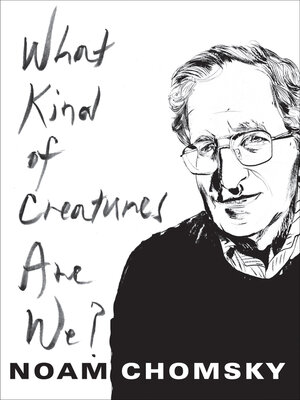
Sign up to save your library
With an OverDrive account, you can save your favorite libraries for at-a-glance information about availability. Find out more about OverDrive accounts.
Find this title in Libby, the library reading app by OverDrive.



Search for a digital library with this title
Title found at these libraries:
| Library Name | Distance |
|---|---|
| Loading... |
The renowned philosopher and political theorist presents a summation of his influential work in this series of Columbia University lectures.
A pioneer in the fields of modern linguistics and cognitive science, Noam Chomsky is also one of the most avidly read political theorist of our time. In this series of lectures, Chomsky presents more than half a century of philosophical reflection on all three of these areas.
In precise yet accessible language, Chomsky elaborates on the scientific study of language, sketching how his own work has implications for the origins of language, the close relations that language bears to thought, its eventual biological basis. He expounds and criticizes many alternative theories, such as those that emphasize the social, the communicative, and the referential aspects of language. He also investigates the apparent scope and limits of human cognitive capacities.
Moving from language and mind to society and politics, Chomsky concludes with a philosophical defense of a position he describes as "libertarian socialism," tracing its links to anarchism and the ideas of John Dewey, and even briefly to the ideas of Karl Marx and John Stuart Mill. Demonstrating its conceptual growth out of our historical past, he also shows its urgent relation to our present moment.
A pioneer in the fields of modern linguistics and cognitive science, Noam Chomsky is also one of the most avidly read political theorist of our time. In this series of lectures, Chomsky presents more than half a century of philosophical reflection on all three of these areas.
In precise yet accessible language, Chomsky elaborates on the scientific study of language, sketching how his own work has implications for the origins of language, the close relations that language bears to thought, its eventual biological basis. He expounds and criticizes many alternative theories, such as those that emphasize the social, the communicative, and the referential aspects of language. He also investigates the apparent scope and limits of human cognitive capacities.
Moving from language and mind to society and politics, Chomsky concludes with a philosophical defense of a position he describes as "libertarian socialism," tracing its links to anarchism and the ideas of John Dewey, and even briefly to the ideas of Karl Marx and John Stuart Mill. Demonstrating its conceptual growth out of our historical past, he also shows its urgent relation to our present moment.







